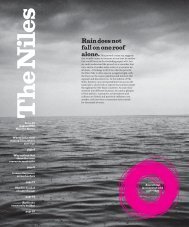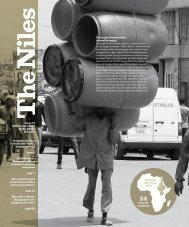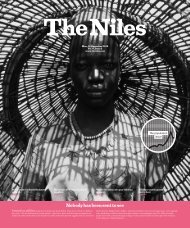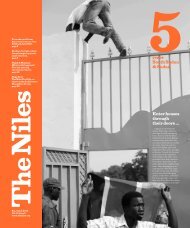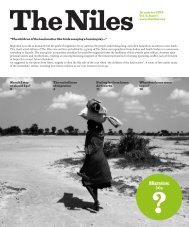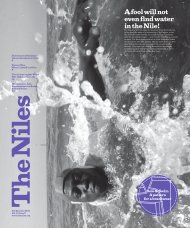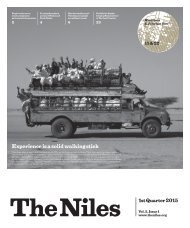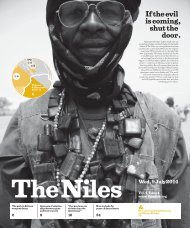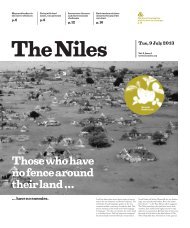When deeds speak, words are nothing
Speaking about sustainable development is easy. Acting sustainably is another matter. And now the evidence is unequivocal: Mankind’s impact on nature is causing the climate to change rapidly and drastically, threatening the environment and the very resources we need to survive. Aware that humanity is careening close to the edge, The Niles correspondents set out to explore where and how people in the Nile Basin region rethink. So much of their findings for now: We are an endlessly innovative species. Cooperation is our superpower. When deeds speak, words are nothing.
Speaking about sustainable development is easy. Acting sustainably is another matter. And now the evidence is unequivocal: Mankind’s impact on nature is causing the climate to change rapidly and drastically, threatening the environment and the very resources we need to survive. Aware that humanity is careening close to the edge, The Niles correspondents set out to explore where and how people in the Nile Basin region rethink. So much of their findings for now: We are an endlessly innovative species. Cooperation is our superpower. When deeds speak, words are nothing.
Create successful ePaper yourself
Turn your PDF publications into a flip-book with our unique Google optimized e-Paper software.
Tuver Wundi
Goma, Democratic Republic of Congo
“Fish are vulnerable to
overfishing, especially when
it occurs in spawning areas.”
The increase of the pirogues from 700
to more than 3,000 currently, and taking into
account the demographic rate around the
Lake Edward, the Congolese government,
by means of the ICCN, in collaboration with
its partners and other stakeholders in this
sector of fishing, recognises 1,187 pirogues
in six fisheries.
The destruction of the spawning grounds
of species including Muramba, Taliha, Kamandi,
and Magiso by the illegal fishermen has
shrunk the yields for those fishing, sparking
the trend of people violating the liquid borders
within the lake.
The Ugandan navy often arrests Congolese
fishers from Kiavinyonge, Kasindi Port, Kisaka
and Nyakakoma in Katwe and Rwashama,
and outboard motors, canoes, nets and other
fishing equipment are seized. At the end of
July 2021, 126 fishermen, including 54 from
Kiavinyonge, 32 from Kasindi Port and 40
from Nyakakoma, were arrested and detained
in Uganda in Katwe with more than 253 canoes,
223 outboard motors from Kiavinyonge, 81
canoes and 71 outboard motors and other
fishing materials.
The lack of fish in the Congolese part is
due to the weak regulation of fishing. An excess
of pirogues is the root cause of overfishing,
leading to a low production yield per pirogue.
Given the falling fish stocks in the Lake
Edward and Albert Basin, the governments
of the DRC and Uganda have recognised
that the two states share a common interest
in the conservation, utilisation and equitable
management of shared natural resources.
Back in 2018, they committed to ensuring
the long-term conservation, management
and sustainable use of the fisheries resources
of Lake Edward and Lake Albert.
In this agreement, the governments of
DRC and Uganda have recognised the need
to establish a sustainable legal and institutional
framework for managing the two lakes.
The countries expressed their determination
to cooperate to eliminate threats to fisheries
resources and ecosystems.
The sustainable use of the fisheries and
other natural resources of Lake Edward and
Lake Albert is the goal of the Lake Edward
and Albert Integrated Fisheries and Water
Resources Management Project (LEAF II),
a transboundary project that brings together
Ugandan and Congolese actors. In part, it
coordinated the joint patrols between DRC
and Uganda in March 2021.
These patrols aimed at ensuring the protection
of the spawning grounds, clearing fishing
equipment not respecting the norms in the
fishing enclaves of Lake Edward and dealing
with illegal fishers caught fishing on the lake.
These patrols concerned the whole lake
but not the river Rwindi up to the river Ntumbwe
due to the presence of Mai-Mai rebels in
these places.
Director Rodrigue Mugaruka, Deputy
Head of Site in charge of the anti-poaching
programme for Virunga National Park, explained:
“We spotted illegal fishermen in the
middle of their fishing. Our elements engaged
in coordinated patrols and carried out 35 patrols
to fight against illegal fishing on the whole of
Lake Edward, Congolese part,” he said, adding
that 163 canals have been closed, and 27 illegal
fishermen were arrested.
Joseph Matungulu Masirika, the National
Coordinator of the LEAF II project in the
DRC, said, “fish are vulnerable to overfishing,
especially when it occurs in spawning areas.
For the well-being of the fish, it is advisable
to clear the illegal villages and the men and
women carrying weapons illegally at the edge
of the park, from the mouth of the Rwindi river
to Muramba,” and added that it was essential
to extending the series of meetings and coordinated
patrols.
Such ongoing cooperation among leading
actors in the region will help implement and
enforce national environmental policy, legislation
and procedures related to the aquatic
ecosystem, securing valuable resources for
future generations. Meanwhile, environmental
education and public awareness should be
among the strategies for maintaining community
integration.
Left:
Fishers on Lake Edward.
Photo: Flickr / Travel Aficionado
Right:
Dugouts used in the illegal
fishery on the west coast
of Lake Edward.
Photo: The Niles / Tuver Wundi
11









